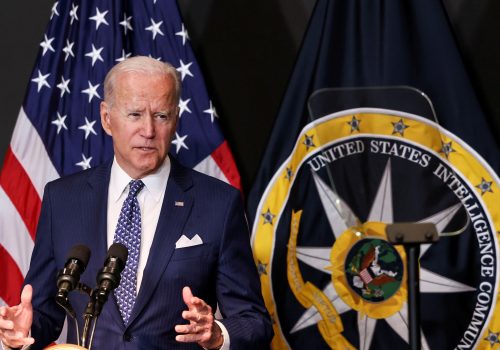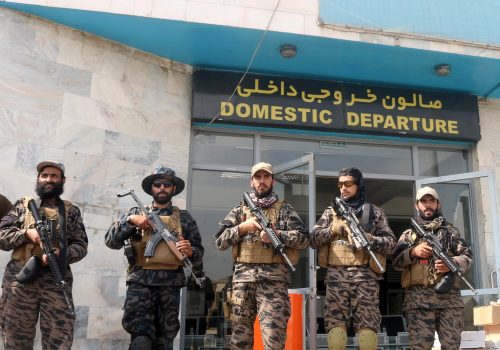Sanctions alone won’t tame the Taliban
After two decades of conflict in Afghanistan, it’s difficult to imagine Western powers resorting to military intervention against the Taliban, even if the group lives up to the worst of everyone’s fears. That leaves economic and financial sanctions—a favored policy option to impose costs and contain adversaries without using force—as the primary tool with which to pressure the country’s new rulers.
Yet the multilateral sanctions regime freezing the group’s assets has been largely dormant for fifteen years as the United States and its allies pushed for reconciliation in Afghanistan. Meanwhile, given the widespread reports of abuses and an interim government packed with hard-liners, few believe a friendlier regime will take shape.
This is why the United States and its allies will need to wield both existing and new sanctions as strategically as possible. That means using the carrot of sanctions relief if the Taliban governs responsibly and the stick of additional sanctions if it doesn’t. No matter which path it chooses, Washington must commit to meaningful humanitarian relief efforts.
A positive outcome may be unlikely—but a good-faith offering is worth the effort, since the alternative scenario will result in increased suffering of Afghans.
A solid foundation
First, the United States and its partners should target several individuals in the Taliban leadership who are not yet subject to US or multilateral sanctions. But allies will also need to quickly pivot to consider broad jurisdictional sanctions, similar to those imposed on Iran or Syria, to deny the Taliban resources it could leverage to cause more harm.
This would amount to a quick escalation of sanctions pressure but would need to be on the table given the threats—the repression of women, human rights abuses, drug trafficking, support for terrorism—the group poses.
While the Taliban faced broad sanctions and political isolation in the 1990s during its previous stint in power, today’s measures are substantially more powerful, targetable, and flexible. The increased centralization of global finance and the primacy of the US dollar in cross-border transactions have made US sanctions a powerful tool in preventing access to international financial markets, even those not involving the United States.
US and international sanctions against al-Qaeda following the 9/11 attacks were successful in cutting off the group’s fundraising efforts and external financial links. That effectiveness was due in large part to al-Qaeda’s external financing model, which left cross-border payments vulnerable to US pressure. By contrast, sanctions against the Islamic State of Iraq and al-Sham (ISIS) were less impactful because the group relied more on internal sources of revenue, such as extortion, bank robbery, and fuel smuggling on territory it controlled.
No silver bullet
Yet it is unclear to what degree the Taliban will seek to conduct lawful international trade, as well as how integral that trade would be to the group’s ability to retain power in Afghanistan, where it enjoys a substantial military edge. This calls into question the effectiveness of sanctions that restrict access to international markets and cross-border transactions.
That does not mean they will be useless. Sanctions could deprive the Taliban of the financial resources and access to arms markets that it could use to project power and export violence beyond its borders. They could also make it harder for the group to control the entirety of Afghanistan by reducing available financial and military resources, leaving pockets of the country free from its repression.
Whatever their impact, sanctions will not be the proverbial silver bullet that solves all the problems presented by the Taliban. Instead, they must be only a part of a multilateral effort to reduce threats both inside and outside Afghanistan. Sanctions are a poor tool for regime change, as CIA Deputy Director David Cohen has argued, and are instead best used to deny resources and build leverage for negotiations.
If the Taliban is willing to rule Afghanistan as something akin to an autarky, however, sanctions may not be effective at changing its behavior, since the leverage they produce will be lessened, even if they can accomplish lesser goals. Moreover, because sanctions can have broad impact, there are side effects that the United States and others need to manage to minimize those effects on the people of Afghanistan.
While jurisdictional sanctions are not directly responsible for a people’s suffering, they undoubtedly have a chilling effect on all trade and economic activity—even in areas such as food and medicine, where there are exceptions to sanctions’ restrictions. I have argued that sanctions implementation needs to be changed in order to ease humanitarian transactions; Afghanistan will be a key test for the Treasury Department.
The United States needs to lead a renewed effort to facilitate humanitarian relief in jurisdictions affected by sanctions. The centrality of the US financial system in global trade and the fear of running afoul of US sanctions often causes private-sector actors around the globe to shy away even from legal trade. In Afghanistan, particularly, the US military withdrawal is the clear reason the Taliban regained power—which is why the United States has a moral imperative to be as aggressive as possible in providing humanitarian support to Afghans suffering under Taliban rule, regardless of sanctions.
Tempering expectations
This will take some hard thinking in Washington, since sanctions exceptions typically do not apply to designated terrorist groups such as the Taliban. So far, the Treasury Department has ensured that those engaged in humanitarian work will not be penalized unduly, which is encouraging for ongoing efforts.
Sanctions are likely to be less effective against the Taliban than they have been against Iran, which is heavily dependent on oil exports and yet remains defiantly in power. The US government needs to be clear-eyed about these shortcomings and the potential adverse consequences on ordinary people. It must work with its partners in the international community, and especially through the United Nations—where multilateral pressure on the Taliban originated—to devise an effective approach.
That should include diplomatic pressure on a leadership group that desires acceptance; law enforcement and intelligence resources deployed against weapons and narcotics smuggling, or support for terrorism; and conditioning any aid to the Taliban, and potentially its external supporters, on promoting positive change in Afghanistan.
It is probably too much to hope that sanctions could be part of an approach that convinces the Taliban to moderate its governing style. Instead, the best the United States and its allies can hope is that sanctions will assist in containing the Taliban’s ability to export violence and perhaps create weaknesses that domestic opposition forces can exploit.
It is sobering to think in such terms after twenty years of Western military intervention in Afghanistan. But if the mistakes of those two decades have taught us anything, it is that we must be honest in assessing likely outcomes.
Brian O’Toole is a nonresident senior fellow with the Atlantic Council’s GeoEconomics Center and a former senior sanctions official at the US Department of the Treasury.
Further reading
Image: Taliban members pose for a photograph in Kabul, Afghanistan, September 4, 2021. WANA (West Asia News Agency) via REUTERS ATTENTION EDITORS - THIS IMAGE HAS BEEN SUPPLIED BY A THIRD PARTY.


